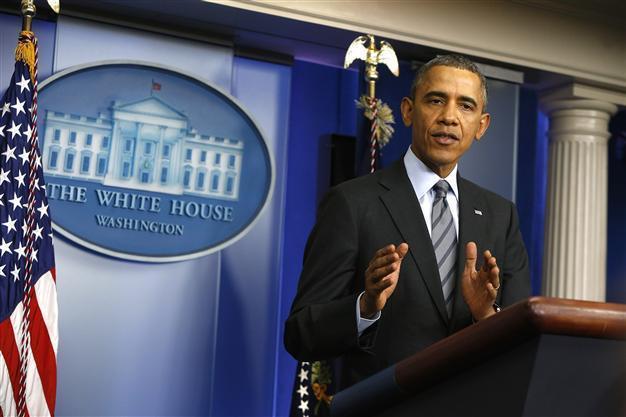Obama warns Putin on Crimea, orders sanctions over Russian moves in Ukraine
WASHINGTON - Reuters

US President Obama delivers a statement on the situation in Ukraine in the press briefing room at the White House in Washington, March 6. REUTERS photo
President Barack Obama on March 6 ordered sanctions on officials responsible for Moscow's military intervention in Ukraine's Crimea Peninsula, including travel bans and freezing of their U.S. assets, and said a referendum by the region to join Russia would violate international law.U.S. officials said a list of people targeted by the sanctions had not yet been drawn up but that Russian President Vladimir Putin was not going to be one of them. White House spokesman Jay Carney said he was not aware of a limit on the number of people listed.
Obama spoke to Putin for an hour on March 6 and said the situation could be solved diplomatically in a way that addressed the interests of Russia, Ukraine and the international community, the White House said.
Escalating the crisis, Crimea's parliament on March 6 voted to join Russia and its Moscow-backed government set a referendum on the decision in 10 days.
Obama signed an executive order aimed at punishing those Russians and Ukrainians responsible for the Russian military incursion into Crimea, which has triggered the worst crisis in U.S.-Russian relations since the end of the Cold War.
Obama, appearing in the White House press room hours after signing the order, said the U.S. sanctions were meant to impose costs on Russia for its actions. He said the international community was acting together and warned that a referendum in Crimea would violate international law as well as the Ukrainian constitution.
"Any discussion about the future of Ukraine must include the legitimate government of Ukraine," Obama said.
"In 2014, we are well beyond the days when borders can be redrawn over the heads of democratic leaders."
Obama and administration officials emphasized that the U.S. sanctions could be adjusted or additional steps taken as Russian behavior changed.
"While we take these steps, I want to be clear that there is also a way to resolve this crisis that respects the interests of the Russian Federation, as well as the Ukrainian people," the president said, calling for international monitors to be allowed into Ukraine as well as direct talks between Moscow and Kiev.
"Russia would maintain its (military) basing rights in Crimea, provided that it abides by its agreements and respects Ukraine's sovereignty and territorial integrity. And the world should support the people of Ukraine as they move to elections in May," he said, calling that the "path to de-escalation."
Obama made the same argument in his call with Putin. "President Obama emphasized that Russia's actions are in violation of Ukraine's sovereignty and territorial integrity, which has led us to take several steps in response, in coordination with our European partners," the White House said in a description of the call.
Russia, US still far apart: Putin
President Vladimir Putin, meanwhile said both countries still stood far apart over Ukraine. He stressed, however, that the two countries should not sacrifice relations over a disagreement on an individual, albeit very important, international problem.
In a statement issued by the Kremlin on March 7, the Russian leader told U.S. President Barack Obama in a telephone call on March 7 that Ukraine's new leaders, who had come to power in an anti-constitutional coup, had imposed "absolutely illegitimate decisions on the eastern, southeastern and Crimea regions."
On March 7 parliament in Ukraine's southern Crimea region voted to join Russia and hold a referendum on becoming part of the Russian federation on March 16, moves which pro-Western leaders in Kiev said would violate international law.
"Russia cannot ignore calls for help in this matter and it acts accordingly, in full compliance with the international law," Putin said.
"(He) stressed the paramount importance of Russian-American relations to ensure stability and security in the world. These relations should not be sacrificed for individual differences, albeit very important ones, over international problems."
Putin has stridently defended Russia's moves in Ukraine, a country he calls a "a brotherly nation", saying Moscow was not behind the seizure of Crimea, home of Russia's Black Sea Fleet.
He has denied western accusations that his troops have captured state buildings there, saying the armed men were member of local self-defence units.
Putin said he agreed with Obama that Foreign Minister Sergei Lavrov and U.S. Secretary of State John Kerry should continue "intensive contacts" on Ukraine.
















